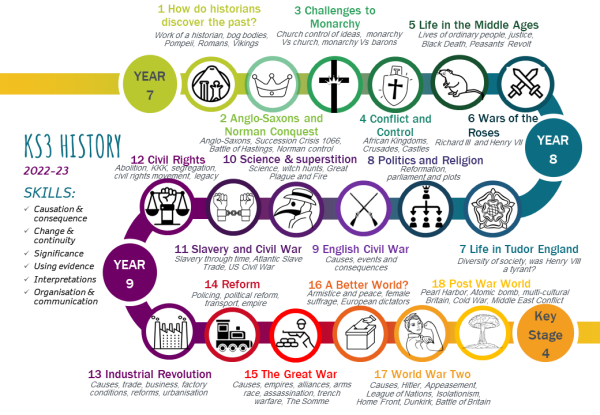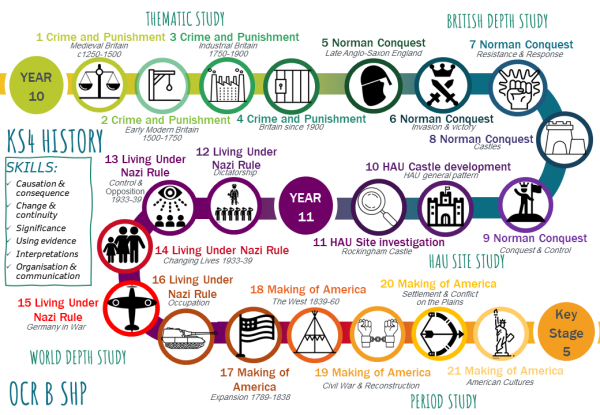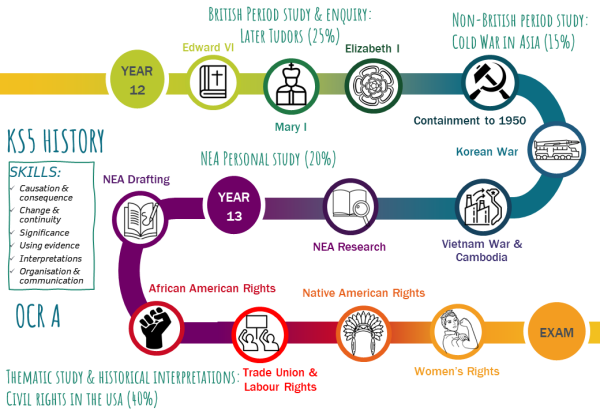History

Faculty Introduction:
The KC History curriculum helps to explain the world as it is by exploring the world as it was, in an intriguing and ambitious way. Historical enquiries are developed around a chronological spine of British history, which explore global, national and local scales, emphasising the complexity of the past. Students develop their disciplinary thinking, exploring the past from multiple perspectives, so that our students don’t just learn about the subject but also gain invaluable transferable skills. We strive to make our KC History curriculum diverse, exploratory and illuminative, so that our students feel represented in the studies that they undertake. These threads are combined and sequenced to craft a coherent, broad, and balanced understanding of the past for every student.
Our curriculum aims to produce “citizen historians” by helping change how our young people understand themselves, the world around them and their own place within it. Undoubtedly, increasing students’ historical knowledge, curiosity, critical thinking, and communication skills are all key functions of our curriculum. Increased knowledge of the past helps inform the identity of our young people; this curriculum will both give them confidence to build strong arguments of their own and the flexibility to incorporate new perspectives into their thinking. The KC History curriculum will help students question and influence the people and communities around them and therefore become active citizens in our school and local community, developing an awareness of their rights and responsibilities in an ever-changing world and hopefully a lifelong interest in the subject.
Our History curriculum exists, within the wider KC curriculum, to develop students and give them new power, through fostering of their intellectual curiosity, awareness of the diversity of experience and ability to form enlightened views, to enable them to take part in the great conversations of our time.
“A people without the knowledge of their past history, origin and culture is like a tree without roots.” Marcus Garvey
Topics / Modules to be covered:
Y7 Overview – Iron Age to 1500
- Enquiry 1: How do historians discover the past? (Using Evidence)
- Enquiry 2: What was Anglo-Saxon England like? (Similarity & Difference)
- Enquiry 3: How far did the Norman Conquest change England? (Causation & Consequence and Change & Continuity)
- Enquiry 4: How was the power of medieval monarchy challenged? (Significance)
- Enquiry 5: African Kingdoms (Causation & Consequence)
- Enquiry 6: What was the impact of the Crusades? (Change & Continuity)
- Enquiry 7: Which sources reveal the most about medieval peasants? (Similarity & Difference)
- Enquiry 8: How far was the Black Death a disaster for England? (Change & Continuity)
- Enquiry 9: Wars of the Roses (Interpretations)
Homework:
The department follows the whole college feedback policy and sets regular homework for all students in Year 7. Parental co-operation is valued. Homework tasks are varied and can include reading, research, writing and revision. Homework is of particular value in History as it is a good way of helping students realise that History happens outside the classroom and affects current affairs.
Assessment:
Students will be assessed through two main summative assessments throughout the year. These are completed in lesson time and marked according to an agreed mark scheme. These summative assessments cover all historical skills in the course of each academic year and are mapped across KS3 to build progression and prepare students for GCSE History. In addition to this, students complete guided practice on each historical skill area regularly in lessons.
Enhancement & Enrichment Activities:
We run a visit for Year 7 students to Kenilworth Castle during term 6. Castle building project.

Faculty Introduction:
The KC History curriculum helps to explain the world as it is by exploring the world as it was, in an intriguing and ambitious way. Historical enquiries are developed around a chronological spine of British history, which explore global, national and local scales, emphasising the complexity of the past. Students develop their disciplinary thinking, exploring the past from multiple perspectives, so that our students don’t just learn about the subject but also gain invaluable transferable skills. We strive to make our KC History curriculum diverse, exploratory and illuminative, so that our students feel represented in the studies that they undertake. These threads are combined and sequenced to craft a coherent, broad, and balanced understanding of the past for every student.
Our curriculum aims to produce “citizen historians” by helping change how our young people understand themselves, the world around them and their own place within it. Undoubtedly, increasing students’ historical knowledge, curiosity, critical thinking, and communication skills are all key functions of our curriculum. Increased knowledge of the past helps inform the identity of our young people; this curriculum will both give them confidence to build strong arguments of their own and the flexibility to incorporate new perspectives into their thinking. The KC History curriculum will help students question and influence the people and communities around them and therefore become active citizens in our school and local community, developing an awareness of their rights and responsibilities in an ever-changing world and hopefully a lifelong interest in the subject.
Our History curriculum exists, within the wider KC curriculum, to develop students and give them new power, through fostering of their intellectual curiosity, awareness of the diversity of experience and ability to form enlightened views, to enable them to take part in the great conversations of our time.
“A people without the knowledge of their past history, origin and culture is like a tree without roots.” Marcus Garvey
Topics / Modules to be covered:
Y8 Overview – Britain 1500 to 1750
- Enquiry 1: How diverse was Early Modern England? (Similarity & Difference)
- Enquiry 2: Was Henry VIII a tyrant? (Interpretations)
- Enquiry 3: Did being a woman stop Elizabeth I being a successful monarch? (Significance)
- Enquiry 4: How was the “world turned upside down”? (Change & Continuity – Revolution)
- Enquiry 5: How “merry” was Stuart England? (Interpretations)
Y8 Overview – From Slavery to Civil Rights in the USA
- Enquiry 1: What is slavery? (Similarity & Difference)
- Enquiry 2: The Atlantic Slave Trade (Causation & Consequence)
- Enquiry 3: Why did Britain abolish the slave trade in 1833? (Causation & Consequence)
- Enquiry 4: How far were civil rights acquired for African Americans? (Change & Continuity)
Assessment:
Students will be assessed through two main summative assessments throughout the year. These are completed in lesson time and marked according to an agreed mark scheme. These summative assessments cover all historical skills in the course of each academic year and are mapped across KS3 to build progression and prepare students for GCSE History. In addition to this, students complete guided practice on each historical skill area regularly in lessons.
Homework:
The department follows the whole college feedback policy and sets regular homework for all students in Year 8. Parental co-operation is valued. Homework tasks are varied and can include reading, research, writing and revision. Homework is of particular value in History as it is a good way of helping students realise that History happens outside the classroom and affects current affairs.
Enhancement & Enrichment Activities:
We run a visit for Year 8 students to the Black Country Living Museum during term 6 in preparation for the Year 9 course. Henry VIII’s Mary Rose warship building project.

Faculty Introduction:
The KC History curriculum helps to explain the world as it is by exploring the world as it was, in an intriguing and ambitious way. Historical enquiries are developed around a chronological spine of British history, which explore global, national and local scales, emphasising the complexity of the past. Students develop their disciplinary thinking, exploring the past from multiple perspectives, so that our students don’t just learn about the subject but also gain invaluable transferable skills. We strive to make our KC History curriculum diverse, exploratory and illuminative, so that our students feel represented in the studies that they undertake. These threads are combined and sequenced to craft a coherent, broad, and balanced understanding of the past for every student.
Our curriculum aims to produce “citizen historians” by helping change how our young people understand themselves, the world around them and their own place within it. Undoubtedly, increasing students’ historical knowledge, curiosity, critical thinking, and communication skills are all key functions of our curriculum. Increased knowledge of the past helps inform the identity of our young people; this curriculum will both give them confidence to build strong arguments of their own and the flexibility to incorporate new perspectives into their thinking. The KC History curriculum will help students question and influence the people and communities around them and therefore become active citizens in our school and local community, developing an awareness of their rights and responsibilities in an ever-changing world and hopefully a lifelong interest in the subject.
Our History curriculum exists, within the wider KC curriculum, to develop students and give them new power, through fostering of their intellectual curiosity, awareness of the diversity of experience and ability to form enlightened views, to enable them to take part in the great conversations of our time.
“A people without the knowledge of their past history, origin and culture is like a tree without roots.” Marcus Garvey
Topics / Modules to be covered:
Y9 Overview – 1750-1975
- Enquiry 1: Industry and factories: good or bad for Britain? (Interpretations)
- Enquiry 2: What does the case of Jack the Ripper reveal about Victorian society? (Using Evidence)
- Enquiry 3: How far did democracy develop in the 19th century? (Change & Continuity)
- Enquiry 4: Was the British Empire a “force for good”? (Interpretations)
- Enquiry 5: What led to the First “World War”? (Causation & Consequence)
- Enquiry 6: How did different people experience the First World War? (Similarity & Difference)
- Enquiry 7: Why did Germany see the peace treaty as unjust? (Significance)
- Enquiry 8: Were the Suffragettes terrorists? (Interpretations)
- Enquiry 9: Why did the dictators rise during the 1930s? (Causation & Consequence)
- Enquiry 10: What was it like to live under Nazi rule? (Causation & Consequence)
- Enquiry 11: How far was Hitler responsible for WW2? (Causation & Consequence)
- Enquiry 12: What happened during WW2? (Significance)
- Enquiry 13: Why should we remember the Holocaust? (Significance)
- Enquiry 14: How did the Empire change to the Commonwealth? (Change & Continuity)
- Enquiry 15: How close did the “Cold War” come to becoming a “hot war”? (Significance)
Assessment:
Students will be assessed through two main summative assessments throughout the year. These are completed in lesson time and marked according to an agreed mark scheme. These summative assessments cover all historical skills in the course of each academic year and are mapped across KS3 to build progression and prepare students for GCSE History. In addition to this, students complete guided practice on each historical skill area regularly in lessons.
Homework:
The department follows the whole college feedback policy and sets regular homework for all students in Year 9. Parental co-operation is valued. Homework tasks are varied and can include reading, research, writing and revision. Homework is of particular value in History as it is a good way of helping students realise that History happens outside the classroom and affects current affairs.
Enhancement & Enrichment Activities:
We run a visit for Year 9 students to Bletchley Park during term 6. An educational visit to see the World War One trenches has also been popular with our Year 9s. First World War trench building project.

Faculty Introduction:
The KC History curriculum helps to explain the world as it is by exploring the world as it was, in an intriguing and ambitious way. Historical enquiries are developed around a chronological spine of British history, which explore global, national and local scales, emphasising the complexity of the past. Students develop their disciplinary thinking, exploring the past from multiple perspectives, so that our students don’t just learn about the subject but also gain invaluable transferable skills. We strive to make our KC History curriculum diverse, exploratory and illuminative, so that our students feel represented in the studies that they undertake. These threads are combined and sequenced to craft a coherent, broad, and balanced understanding of the past for every student.
Our curriculum aims to produce “citizen historians” by helping change how our young people understand themselves, the world around them and their own place within it. Undoubtedly, increasing students’ historical knowledge, curiosity, critical thinking, and communication skills are all key functions of our curriculum. Increased knowledge of the past helps inform the identity of our young people; this curriculum will both give them confidence to build strong arguments of their own and the flexibility to incorporate new perspectives into their thinking. The KC History curriculum will help students question and influence the people and communities around them and therefore become active citizens in our school and local community, developing an awareness of their rights and responsibilities in an ever-changing world and hopefully a lifelong interest in the subject.
Our History curriculum exists, within the wider KC curriculum, to develop students and give them new power, through fostering of their intellectual curiosity, awareness of the diversity of experience and ability to form enlightened views, to enable them to take part in the great conversations of our time.
“A people without the knowledge of their past history, origin and culture is like a tree without roots.” Marcus Garvey
If you choose to study History at KS4 we follow the OCR History B Schools History Project Full Course (J411)
Topics / Modules to be covered:
- Crime and Punishment c.1250 to present (exam course – thematic study 20%) The first unit of the GCSE course allows students to explore a theme over time. This unit looks at attitudes to crime and punishment from the later Middle Ages to the present, including topics such as witchcraft, highway robbery, the death penalty, prisons and the police.
- The Norman Conquest, 1065–1087 (exam course – British depth study 20%) This depth study should enable learners to understand the complexity of the Norman Conquest and the interplay of political, military, religious, economic, social and cultural forces in England between 1065 and 1087. Topics include the battles of Stamford Bridge and Hastings, William’s “Harrying of the North”, Norman castles and the Domesday Book.
- Site investigation of Rockingham Castle (exam course – History Around Us 20%) This unit is a site investigation allowing students to examine evidence for themselves to draw conclusions about change and continuity over time and the usefulness and reliability of sources of evidence.
- The Making of America, 1789-1900 (exam course – period study 20%) This period study follows the unfolding narrative of the making of America from the inauguration of the first president in 1789 to the end of the nineteenth century when the USA was set to become the world’s dominant power. Learners will need to understand how and why American territory expanded during these years and the relationship between this expansion and the cultures of indigenous Americans, African Americans and white Americans.
- Living Under Nazi Rule 1933 – 1945 (exam course – world depth study 20%) The final unit of the GCSE explores life inside the Third Reich for different groups of society and should enable learners to understand the impact of the Nazi dictatorship on people’s lives both within Germany and across occupied Europe.
Assessment:
- British History Paper (Component Group 1 – 1 hour 45 minutes) 40% – assessing the Crime and Punishment and Norman Conquest units (taught in Y10)
- History Around Us (Component Group 2 – 1 hour) 20% - assessing the Rockingham Castle site study (taught in Y10)
- World History Paper (Component Group 3 – 1 hour 45 minutes) 40% - assessing the Making of America and Living Under Nazi Rule units (taught in Y11)
Homework:
Homework at KS4 is set in line with the whole school policy. Parental co-operation is valued. We aim to set a range of tasks and can include reading, research, writing and revision. Homework is also a good opportunity for students to reflect on feedback comments made by their teachers and improve or re-attempt written work as necessary. Independent reading and lots of revision is also encouraged.
Enhancement & Enrichment Activities:
Compulsory site investigation visit to Rockingham Castle for the examination in term 5 of Year 10.

Faculty Introduction:
History equips you with knowledge and skills which are highly valued by universities and employers. The ability to study History shows that you are capable of analysis, clear presentation, discussion, group work, individual study and research from books, databases and the Internet. The study of History enables you to think critically and question both the past and the world around you. Our aim is to create independent learners, critical thinkers and decision-makers – all personal assets that can make students stand out as they progress to higher education or the workplace.
If you choose to study History at A level we follow the OCR History A H505.
Topics / Modules to be covered:
Unit 1: England 1547–1603: the Later Tudors (Enquiry topic: Mid Tudor Crises 1547–1558) (Y107)
This unit has 2 elements - a British period study and enquiry. The document enquiry is focused on Mid-Tudor Crises in Edward VI and Mary I’s reigns 1547-1558 and includes the stability of the monarchy; religious changes; rebellion and unrest. Assessment involves the critical use of sources of evidence. The essay-based period study is focused on Elizabeth I’s reign 1558-1603 and includes religion; the nature of government and parliament; economic and social affairs; Elizabethan later years 1588-1603.
Unit 2: The Cold War in Asia 1945–1993 (Y222)
This unit is a non-British period study that includes western policies in post-war Asia 1945-79; the Korean War 1950-53 and its impact to 1977; Indochina 1945-67; Wars in Vietnam and Cambodia 1968-93. It is assessed by essay questions and shorter questions on the significance of events.
Unit 3: Civil Rights in the USA 1865–1992 (Y319)
This unit has 2 elements - a thematic study and historical interpretations depth study. The essay-based thematic study covers an extended period of over 100 years; the depth study involves evaluating historians’ interpretations of events within this period. The study includes the position of African Americans, Native Americans, women and Trade Union and Labour rights.
Unit 4: Topic based essay (Y100)
This is the internally assessed element of the course and provides students with the opportunity to explore a topic of personal interest through independently researched coursework.
Assessment:
Unit 1: England 1547-1603 the Later Tudors (Y107) is worth 25% of the course.
Assessed by a 1 hour 30 minutes written exam paper. One period study essay from a choice of two; one document-based enquiry question.
Unit 2: The Cold War in Asia 1945-1993 (Y222) is worth 15% of the course.
Assessed by a 1 hour written exam paper. Students answer both parts from one of the two questions set: Shorter questions on the significance of events; and then one period study essay question.
Unit 3: Civil Rights in the USA 1865-1992 (Y319) is worth 40% of the course.
Assessed by a 2 hour 30 minute written exam paper. Two theme questions from a choice of three, all covering 100 years; one interpretations question.
Unit 4: Topic based essay (Y100) is worth 20% of the A Level.
A 3,000-4,000 word personal study essay. A personal and independently researched investigation of the student’s choice.
Homework:
The History Department aims to set at least three written assessed tasks (i.e. essays or exam questions) per half term. A Level students are also set ongoing reading, research, several formats of writing and revision tasks that support class work. A Level Historians are advised to complete a minimum of six hours of private study per week.
Enhancement & Enrichment Activities:
The History Department runs revision sessions and supports G&T students with applications to university. We run trips that fit with the specification of the examination course, such as a trip to the Tower of London. Participation in the HA summer essay competition. Visit to the library at the University of Northampton.




